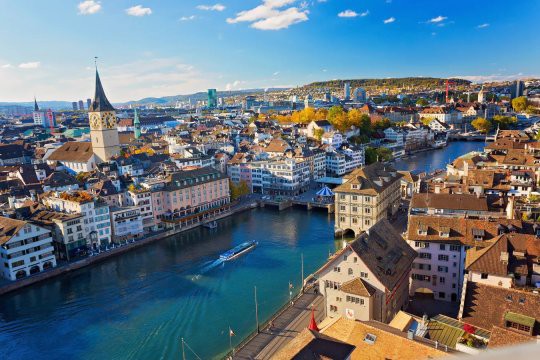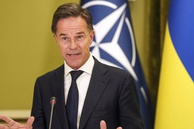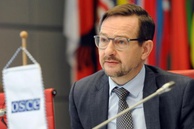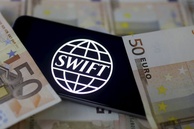This June Switzerland is planning to host “an international high-level conference with a view to suggest ways to end the war in Ukraine”. Without considering the interests of Moscow, the idea appears dead-born.
The conference, which will focus on “the discussion of Ukrainian conflict”, is to be held in Burgenstock Resort, in Canton Nidwalden. At the end of last week, Switzerland’s President Viola Amherd said that the authorities would begin to send invitations “within the next few days”. According to western media, the Alpine nation’s federal government is hoping to hold the conference on June 15-16.
The idea of holding an international conference in order to work out “a peace formula” for Ukraine was proposed by Vladimir Zelensky, on the fringes of the World Economic Forum in January. Bern, traditionally positioning itself as a major international mediator, offered to organize this international event in the course of several months arguing that the discussions may be attended by delegates from 80-100 countries.
As expected, a preliminary intention to take part in the forum has been expressed by most countries of the West, presenting themselves as “Ukraine’s allies”. According to Swiss journalists, the Alpine republic’s diplomats are urging countries of the “Global South” to attend too. In the words of Viola Amherd, cited by “Kommersant”, the purpose of the event is “to look into the possibility of launching a negotiating process on Ukraine with the participation of as many countries as possible”. They hope for the arrival of representatives of China and the BRICS countries.
Russian officials characterize the forthcoming conference as “a show for the public”. In his Telegram-channel Federal Council Vice Speaker Konstantin Kosachev reports that “they kept postponing the date”, “….”quietly” they downgraded the status of the event: instead of the hyped “Summit of Peace” they are now talking about a conference only”. Countries of Africa, Asia and Latin America are being urged to come to Switzerland under the pretext of focusing on issues, such as energy or food security. “And if some expressed readiness to address these more than relevant for many poor countries issues, it was interpreted as being in agreement with the main Western conditions: the withdrawal of Russian troops, payment of reparations and trial of Russian leadership”.[i] Russian Foreign Minister Sergei Lavrov, commenting on the Ukrainian-Swiss initiative, said that potential participants “were being lured into the event…..in a primitive and crooked manner”.[ii]
What is seen as the main stumbling block is the agenda of the future forum. In the opinion of Zelensky, Russian representatives should not attend the event or participate in the discussion of “the peace formula”. Kyiv would prefer Moscow to be presented with a coordinated plan, which it should accept as a whole. For an analogue, they cite the grain deal, which, in the version of the Ukrainians, was elaborated exactly in this very manner.[iii] In addition, Ukrainian officials demand that a peace agreement can be signed only on the condition of “a complete withdrawal of Russian troops beyond the Ukrainian borders of 1991”.
In the opinion of the Turkish Evrensel, while calling on Switzerland to organize a peace conference, Ukraine did not necessarily demonstrate readiness for a compromise. It could be no more than a diplomatic maneuver, designed to play for time. Moreover, “most “conferences on Ukraine”, which were held until now, have turned into meetings to raise funds for Kyiv”. In the long run, the forum in Switzerland may become yet another venue where they will urge the attendees to increase financial and military assistance to Kyiv”.[iv]
According to the Swiss Le Temps[v], Confederation diplomats are considering different options which could lay a foundation for a compromise. Up for review are all more or less prominent peace plans which have been put forward to this day. The Turkish, for one, which was devised with the participation of Ankara in the spring of 2022. It provided for a cessation of military operation on the contact line and preservation of the Russian control of the Crimean Peninsula. Kyiv was to assume a neutral status while being granted security guarantees, which were to be deliberated in the future. Ukraine was also supposed to reduce the number of its armed forces.
The organizers of the form lay big hopes on China. In February 2023 the Chinese diplomatic agency published its own version of a peace plan, designed to put an end to the Ukrainian conflict. Beijing’s proposals consist of 12 points, which call for sovereignty respect, cessation of military operations, and peace talks. Western critics claim that China’s proposals are devoid of “specifics”, while the United States has described them as an initiative that envisages unilateral advantages for Russia. Kyiv has rejected it, citing the absence of a direct demand for the withdrawal of Russian troops.
On April 10 media channels reported the appearance of a new version of the “peace plan” from Turkey. According to “leaks”, “the Turkish plan” calls on Moscow and Kyiv to proceed from preliminary agreements which the parties concerned managed to achieve in Istanbul in the spring of 2022. They provide for a cessation of military operations along the confrontation line and exchange of POWs on the basis of the “all for all” principle. Ukraine should declare itself a bloc-free nation until 2040. It should then hold a nationwide referendum on foreign policy. The territories which came under Russian jurisdiction should hold referendums “under international control” on their further status. Hypothetically, "the Turkish formula” also stipulates for an agreement between Russia and the USA on guarantees not to use nuclear weapons “under any circumstances” and reactivate the New START Treaty.
On April 11, TASS, citing “a diplomatic source in Turkey”, reported that the existence of a new “Turkish plan” “had not been confirmed yet”. The current situation in the conflict zone differs greatly from the one that was in place during the Istanbul talks. More importantly, as the TASS source reports, Istanbul is fully aware of the fact that a peace treaty will be impossible to conclude without a direct participation of Russia. Given this, the forthcoming conference in Switzerland seems “pointless”.[vi]
It is the absence of Russia among the full-fledged participants of the planned conference in Switzerland that promises to become the core issue. Swiss President Amherd said in a media interview that Bern is not planning to invite Moscow to take part in the forum. On April 10 Switzerland’s Foreign Ministry Press Secretary Pierre-Alain Eltschinger told RIA Novosti that Russia’s participation “is necessary for reaching a lasting peace”. However, according to reports submitted by the Russian Embassy in Switzerland, the Confederation did not send Russia any invitation form.[vii] Given the conditions, Moscow has made it clear that it will not recognize any decisions passed by any countries or groups of countries anywhere without its participation.
On April 11 Maria Zakharova, a Russian Foreign Ministry spokesperson, pointed out that «…Russia had no intention and has no intention to take part in Switzerland-organized “gathering” on the so-called formula of peace from the president of Ukraine»».[viii] On the same day, during a meeting with Belarus President A.Lukashenko, Vladimir Putin made it clear that Russia’s foes had driven themselves into a dead alley when they waived talks hoping to win on the battlefield. Now, it has become clear that such a development is not the option. Having said ‘no’ to a dialogue, Russia’s opponents «found themselves in a fairly bad plight». About the issue of holding a conference on Ukraine in Switzerland, the Russian president said that «…since we are not invited – and this is a panopticon of sorts – they say we refuse to negotiate. We were not invited, but they say we refuse to come.» «I would like to emphasize once again that we are in favor of talks. But we will not accept a format when they make us agree to schemes which have nothing to do with the reality».[ix]
On April 12 Press Secretary Dmitry Peskov underscored that a return to direct talks between Moscow and Kyiv is possible on condition the other party is ready for a dialogue. Such a discussion could base on the agreements signed in Istanbul in 2022, with due regard to the dramatic changes that have occurred in the past two years, such as the appearance of new entities within the Russian Federation, Peskov said. These are the realities «we cannot ignore». Peskov also reiterated the position of the Russian president that negotiations or diplomatic forums without Russia are doomed to failure.[x]
The Swiss diplomatic circles do acknowledge that the absence of Russia among the participants in the conference makes the event pointless. What could be a «compromise» solution, as some officials in Bern say, is the invitation of Russia if or after the initial participants in the forum have «achieved progress in the first round».
In the opinion of Russia, what can serve as an example of a balanced and constructive approach to the settlement of the Ukrainian crisis is the position of China, Dmitry Peskov said on April 16. Peskov was commenting on a statement by Chinese President Xi Jinping during a meeting in Beijing with German Chancellor Olaf Scholz. As the Chinese leader pointed out, «in order to secure peace in Ukraine the parties concerned should strive for stability, rather than pursue their own interests». Xi Jinping called for organizing a peace conference which would be accepted by both Moscow and Kyiv.[xi]
Meanwhile, the conditions for talks proposed by Moscow are well-known, having been presented to the attention of the international community repeatedly at top level. The tactic of unilateral actions chosen by Russia’s opponents will only make the crisis longer and will do nothing to secure its settlement.
The views of the author are his own and may differ from the position of the Editorial Board.
[i] https://t.me/Kosachev62/1305
[ii] https://mid.ru/ru/foreign_policy/news/1942589/
[iii] https://www.rbc.ru/politics/25/02/2024/65db5a7c9a7947c17b004c0d
[iv] https://inosmi.ru/20240411/ukraina-268564588.html
[v] Перевод https://inosmi.ru/20240410/sammit-268562500.html
[vi] https://tass.ru/mezhdunarodnaya-panorama/20517207
[vii] https://ria.ru/20240410/shveytsariya-1939216365.html
[viii] https://tass.ru/politika/20515333
[ix] http://kremlin.ru/events/president/news/73852
[x] https://tass.ru/politika/20525449
[xi] https://russian.rt.com/world/news/1300747-konferenciya-ukraina-rossiya
read more in our Telegram-channel https://t.me/The_International_Affairs

 11:46 19.04.2024 •
11:46 19.04.2024 •



























